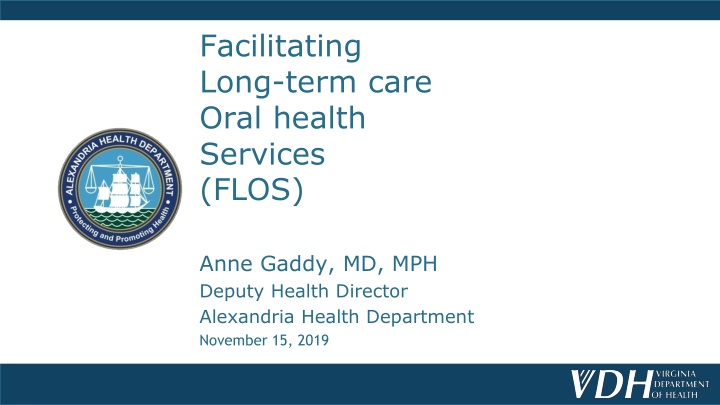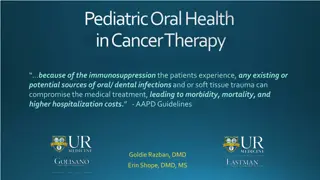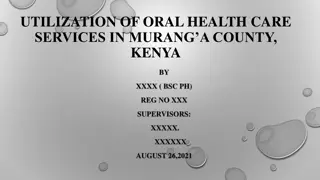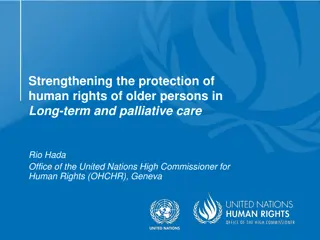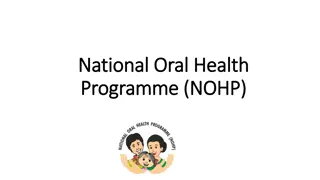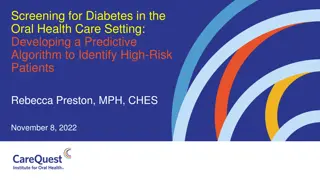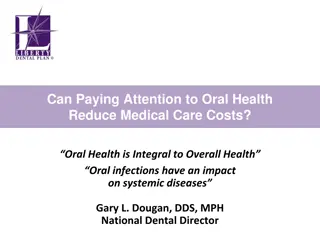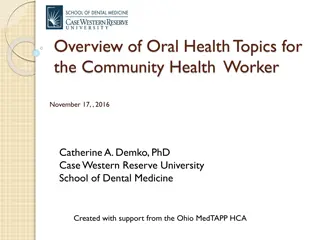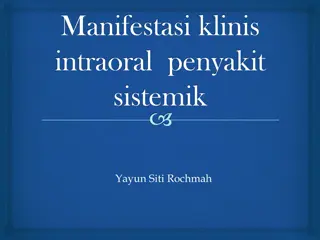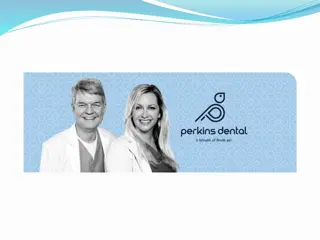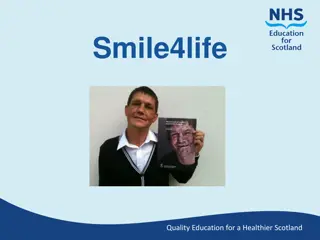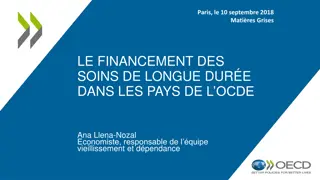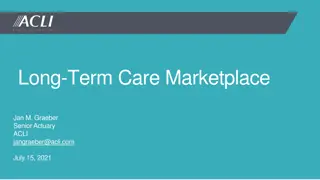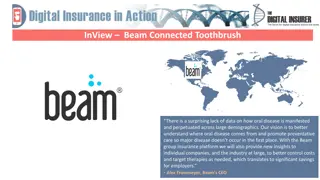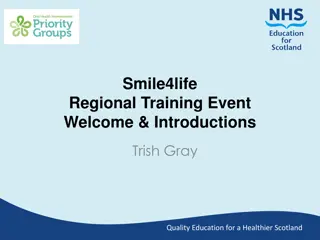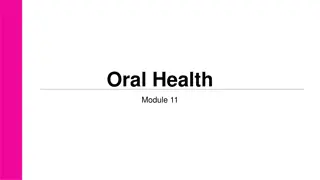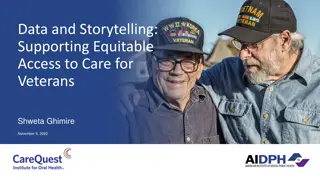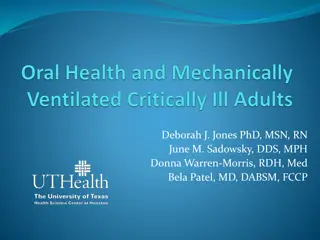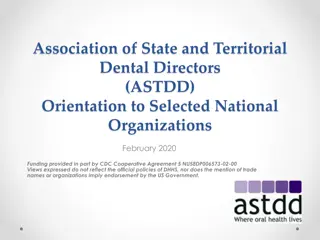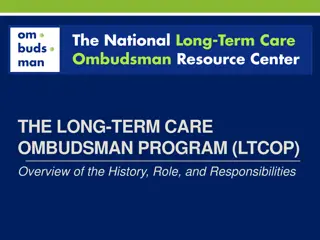Facilitating Long-Term Care Oral Health Services in Alexandria
This presentation by Anne Gaddy, MD, MPH, Deputy Health Director of the Alexandria Health Department, focuses on the goals and methods of the FLOS program to improve oral health in long-term care facilities in Alexandria. It highlights the importance of addressing oral health issues in vulnerable populations and shares insights into the challenges faced by these facilities.
Download Presentation

Please find below an Image/Link to download the presentation.
The content on the website is provided AS IS for your information and personal use only. It may not be sold, licensed, or shared on other websites without obtaining consent from the author.If you encounter any issues during the download, it is possible that the publisher has removed the file from their server.
You are allowed to download the files provided on this website for personal or commercial use, subject to the condition that they are used lawfully. All files are the property of their respective owners.
The content on the website is provided AS IS for your information and personal use only. It may not be sold, licensed, or shared on other websites without obtaining consent from the author.
E N D
Presentation Transcript
Facilitating Long-term care Oral health Services (FLOS) Anne Gaddy, MD, MPH Deputy Health Director Alexandria Health Department November 15, 2019 1
BACKGROUND Alexandria Health Department 2
FLOS Goals Identifying determinants of oral health in Alexandria s LTC facilities Creating recommendations to improve oral health in Alexandria s LTC facilities 3
FLOS Methods Long-term care facilities Dentists Oral health community 4
5 Why Long-Term Care Facilities? Long-term care residents are some of the most vulnerable individuals in the older adult population Limited mobility, decreased dexterity, and declining vision Medical conditions Dry mouth Memory impairment 5
6 Why Oral Health? Mouth pain Difficulty chewing or swallowing Decreased oral intake Necessity for a liquid diet Weight loss Pneumonia Psychological distress Social isolation Diabetes, heart attack, stroke, and COPD are all associated with poor dental health although a causal relationship has not been established 6
7 Diversity Among 9 LTC Facilities Capacity: 28 to 408 beds per facility. Combined capacity over 1,300 people. Level of care: Independent living, assisted living, skilled nursing Mobility: Independently mobile, need a wheelchair, need a stretcher Specialized services: Memory care, ventilator care, palliative care, rehabilitation Age of residents: Late sixties and older. Youngest residents in their twenties. Payer Mix: Medicaid, Medicare, private insurance, self-pay, or combination 7
INSIGHTS Alexandria Health Department 8
9 One facility feels all their residents need dental care, either because of an acute issue, or because the last preventive care was years ago. Yet, they estimate only 10 percent of patients are receiving dental services 9
10 Care Coordination Care coordination is resource intensive One person identifies the need for an appointment Second person makes the appointment identifying if insurance covers the patient s needs or if patient can afford any uncovered services identifying a provider who takes the insurance provides the needed service will see an older adult with access or functional needs Third person coordinates transportation Fourth person arranges a staff escort for the resident 10
11 Care Coordination Contrast with access to podiatry, audiology, ophthalmology Insurance Coverage --facility can easily coordinate the service --patient can afford the service --providers are compensated for their time Providers experienced with the special needs of older adults 11
12 Accessible community dental providers None of the facilities we spoke to identify a community dental office as showing a particular interest in or special capacity for treating older adults Experience and comfort level with taking care of older adults Technically ADA compliant, but not necessarily mobility friendly 12
13 Accessible community dental providers Inadequate reimbursement Physical limitations of patient uncomfortable for patient uncomfortable for the dentist Memory limitations care consent follow up instructions Combative or disgruntled patients Temporary improvement in oral health 13
14 Family Awareness and involvement Families can be a significant asset for obtaining dental care Providing transportation Navigating the care coordination process identifying dental providers figuring out insurance coverage scheduling appointments Providing daily oral care 14
15 Transportation Staff person to go off site Required documentation for resident leaving the premises Affordable options require eligibility and have scheduling and pick-up windows Logistically easier options are more costly 15
16 Mobile Dental Services Many facilities expressed interest in mobile services One facility has an in-house dental clinic Some facilities report patients/patients families coordinating their own care 16
17 Staff role in oral assessment and care Facilities express interest in staff education Nurses complete oral health assessments (on admission and periodically thereafter) Certified Nursing Assistants (CNAs) are responsible for daily mouth care. Daily oral care can be challenging for patients who are memory challenged, combative, or have particularly poor oral health. 17
18 Personal Prioritization of Care Most facilities report residents want access to services for dental problems. Most facilities are unsure of the proportion of residents wanting preventive care. 18
19 Specialty Services Facilities report that obtaining subspecialty services can be difficult Denture services are the most common specific need Closest office offering affordable dentures is in Woodbridge Subspecialty services tend to be more costly than general dentistry 19
20 Medical Clearance Currently there are no standard forms or avenues of communication between physicians and dentists for the purpose of medical clearance Physicians may not be familiar with what information is pertinent to dentistry If no in-house physician, obtaining clearance may take time 20
RECOMMENDATIONS Alexandria Health Department 21
22 Conceptual Framework Concise, visual aid to summarize how the determinants of dental health interact Enables the wisest use of resources Would be best designed by a small group of people who collectively have expertise with older adult dentistry, long-term care facilities, Alexandria s stakeholders, and social determinants of health 22
23 Champion Regional Facility 23
24 Educating facility staff Implement within existing training structures Trainer knowledgeable about older adults Considers facility s daily care routine and capacity Staff turnover Virginia Department of Health training tools Brushing up on Mouth Care tools Resource manual Training tools Educational tools 24
25 Educating residents and their caregivers 25
26 Physical Aids Electric toothbrushes Modified toothbrushes Daily mouth care toolkit 26
27 Increasing capacity of dental providers Identify dentists interested in providing senior care Increase capacity of providers to provide care Reimbursement Knowledge Office environment Telemedicine with hygienist on site for first visit 27
28 Resource Guide Local dental offices Local dental specialty care offices Mobile dental services Insurance types accepted by each provider, including Medicaid MCOs Note which providers have self-identified as senior friendly 28
29 Evaluation LTC facilities Dental providers Feasibility Sustainability Utility 29
30 Communication Local LTC facilities Alexandria Public Health Advisory Commission Local AARP Virginia Health Catalyst Northern Virginia Adults Oral Health Workgroup Alexandria Agency on Aging Alexandria Commission on Aging Dental providers Virginia Healthcare Association (VHCA) Virginia Department of Health Division of Dental Health Virginia Dental Association long-term care workgroup 30
QUESTIONS? Alexandria Health Department 31
